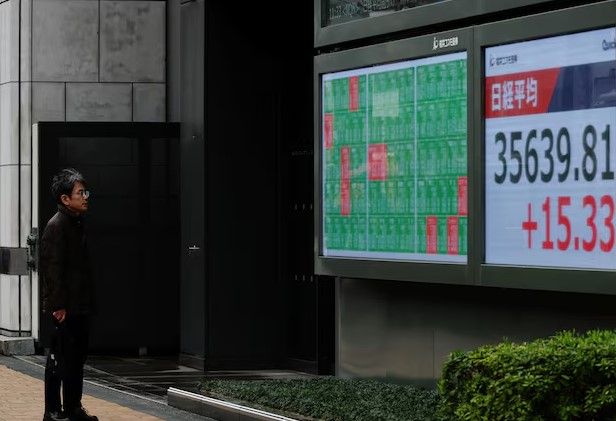HONG KONG: Hedge funds dumped stocks and lowered leveraged positions in Asian markets last week, data from Morgan Stanley shows, pointing to their defensive stance before U.S. President Donald Trump’s announcement of new reciprocal tariffs on April 2.
South Korea, onshore Chinese markets and Taiwan were at the fore of the sell-off, while hedge funds added short bets in Japan, Morgan Stanley said in a prime brokerage note this week.
Trump is set to impose reciprocal duties on Wednesday that could lead to a sharp rise in tariff rates on several countries and upend the global trade system.
Export-driven Asian markets are particularly vulnerable to tariff risks. China, Vietnam, Japan, and Taiwan have the largest trade surpluses with the U.S., according to a recent U.S. Treasury report.
Japan and South Korean stocks have tumbled 6% and 5% respectively since Trump announced a 25% tariff on imported cars on March 26. China’s CSI 300 Index and Hong Kong’s Hang Seng hit nearly one-month lows on Monday on tariff worries.
“Asia hedge funds had a tough week,” Morgan Stanley analysts said, estimating these funds lost roughly 60 to 70 basis points in returns last week, resulting in these funds closing the month down 0.37% on average.
The selling suggested hedge funds scrambled to cut losses ahead of Trump’s sweeping tariffs.
Their “net leverage (across Asia) came down sharply,” Morgan Stanley said, dropping 6 percentage points to 61% last week from the previous week.
By region, they flipped to sell South Korean shares ahead of the country lifting a short-selling ban that had been in place for five years, unwound consumer stocks in mainland China and exited sizable Taiwan positions, Morgan Stanley said.
The outflows last week were mainly driven by multi-strategy and macro funds, the bank added.
To be sure, hedge funds are exiting positions globally. But a separate note by Goldman Sachs revealed Asian stocks have been particularly sold in large amounts in March, with the net value of selling by hedge funds being the biggest since October 2024. – Reuters


